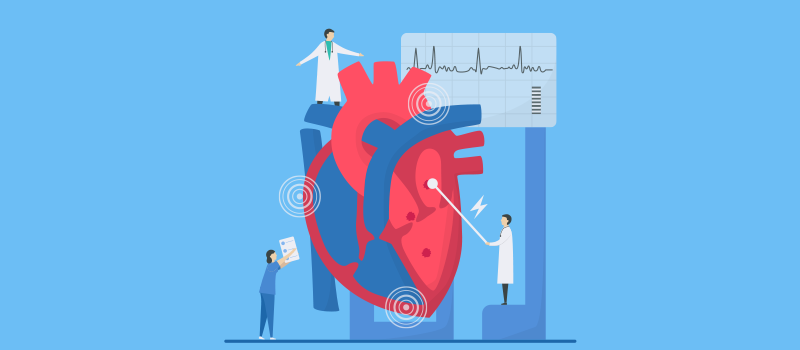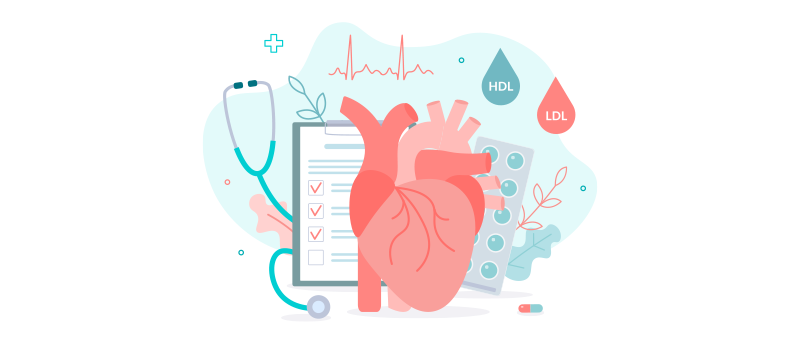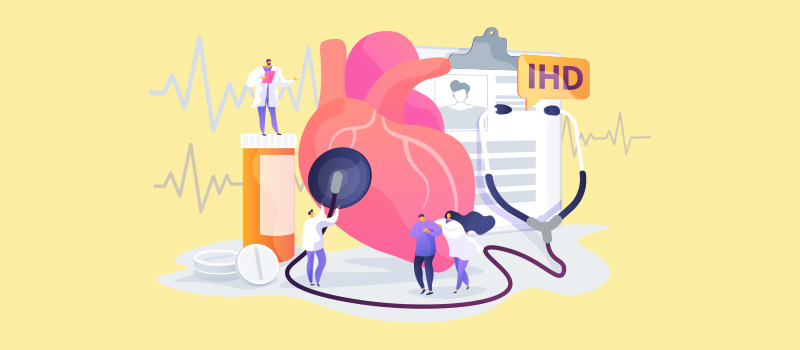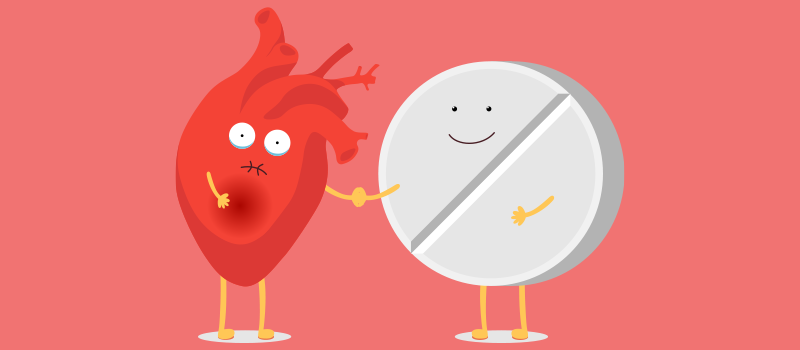What’s the Buzz
The Bee Healthy Blog
6 Most Common Causes of Heart Disease

Knowing the common causes of heart disease is important. It can help you take steps to lower your risk of heart disease. In this article, we’ll talk about some of the common causes and risk factors for cardiovascular disease so that you can take timely action if you are at increased risk.
How common is heart disease?
Cardiovascular diseases are the leading cause of death in the United States. One person dies every 36 seconds from cardiovascular disease. More than 650,000 people die from heart disease in the U.S. every year, which is 1 in every 4 deaths. Healthcare services, medications, and lost productivity due to premature deaths from heart disease cost the nation over $350 billion every year.
Worldwide, cardiovascular disease claims nearly 18 million lives a year, accounting for 1 in every 3 deaths.
These figures are alarming, and rightly so. But you can lower your risk of heart disease to a large extent with behavioral and lifestyle changes. And should you develop heart disease, early detection and treatment can help reduce its most devastating consequences, such as heart attack.
What are the different types of cardiovascular diseases?
Cardiovascular diseases (CVDs) affect the heart and blood vessels. There are different types, including:
- Coronary heart disease or coronary artery disease (CAD), which affects the blood vessels supplying the heart muscle. Angina (chest pain) occurs when the coronary arteries are narrowed, and blood flow is reduced. A heart attack occurs when the blood supply to the heart muscle is completely blocked. This most commonly occurs due to a build-up of fatty deposits in the inner lining of the blood vessels.
- Cerebrovascular disease, which affects the blood vessels supplying the brain. A stroke occurs when blood supply to the brain is blocked, or there is bleeding from one of the blood vessels in the brain.
- Arrhythmias or irregular heartbeats, which are heart rhythm problems.
- Congenital heart disease or birth defects that develop when a baby is growing in the womb.
- Rheumatic heart disease, in which there is damage to the heart valves and muscle from Streptococcal bacteria that cause rheumatic fever.
- Heart infections (endocarditis) caused by germs like bacteria and viruses.
- Cardiomyopathy (a disease of the heart muscle), which makes it difficult for the heart to pump blood, leading to heart failure, sometimes requiring heart transplantation.
- Peripheral vascular disease, which affects the blood vessels that supply blood to the arms and legs
- Deep vein thrombosis and pulmonary embolism in which there are blood clots in the leg veins. A blood clot can dislodge and go to the lungs and heart.
What is the most common disease in the heart?
The most common form of cardiovascular disease in the U.S. is coronary artery disease (CAD). Around 18 million Americans have CAD—coronary artery disease claims over 350,000 American lives each year.
What are the leading causes of heart disease?
There are various causes of heart disease ranging from lifestyle factors to bacteria and genetics.
Causes of coronary artery disease
The most common cause of coronary heart disease is a buildup of fatty deposits in the arteries that supply the heart. This is known as atherosclerosis, and it occurs due to unhealthy lifestyle habits such as a poor diet, lack of physical activity, being overweight or obese, and smoking.
Causes of heart arrhythmia
Arrhythmia (irregular heartbeat) can occur due to coronary artery disease, congenital heart disease, valvular heart disease, diabetes, high blood pressure, smoking, excessive caffeine or alcohol use, drug abuse, or as a side effect of certain medications, including prescription drugs and herbal remedies.
Causes of congenital heart defects
Congenital heart defects develop during a pregnancy when a baby is growing in the womb. They can occur due to medical conditions, medications, or genes. Sometimes, heart defects occur in adults as the heart’s structure changes with age.
Causes of cardiomyopathy
Cardiomyopathy (a thickened and enlarged heart muscle) can occur due to damage to the heart after a heart attack, from certain drugs or toxins, over time due to high blood pressure or age, or it may be inherited. Sometimes the cause for this type of heart disease is unknown.
Causes of heart infection
Endocarditis (heart infection and inflammation) occurs when bacteria, viruses, or parasites reach the heart muscle.
Causes of valvular heart disease
The heart valves can be damaged at birth, in people with connective tissue disorders, or due to infectious endocarditis or rheumatic fever.
What are the top 6 risk factors for heart disease?
High Blood Pressure
Hypertension or high blood pressure is a leading risk factor for heart disease. High blood pressure forces the heart to work harder to pump blood. It can also damage the arteries.
A healthy adult's normal blood pressure reading should be 120/80 mmHg or lower. Healthcare professionals diagnose hypertension if blood pressure is consistently higher than systolic 130 mmHg or diastolic 80 mmHg.
Keep in mind that high blood pressure is often silent, i.e., it does not have any symptoms or warning signs. You may not know you have hypertension until you measure your blood pressure.
High Blood Cholesterol
High blood cholesterol levels are a major risk factor for heart disease. An unhealthy diet high in saturated fat can lead to the buildup of plaque on artery walls, starting the process of atherosclerosis in a critical blood vessel.
A total cholesterol level of less than 200 mg/dL is considered desirable in adults. Your cardiovascular medicine doctor will also look at other types of cholesterol like triglycerides, LDL (bad cholesterol), and HDL (good cholesterol) to evaluate your heart health.
Diabetes
Heart problems are common among people with diabetes. According to the American Heart Association, roughly 65% of people with diabetes die from some form of cardiovascular disease. If you have diabetes, you should be under a doctor’s care. Controlling your blood sugar levels can reduce your risk of cardiovascular disease.
Overweight and Obesity
Being overweight (BMI 25 to 29.9) or obese (BMI 30 or higher) can lead to high blood pressure, high cholesterol levels, and diabetes, all of which are major risk factors for heart disease.
You can calculate your BMI (body mass index) on the National Heart, Lung and Blood Institute website. Eating a healthy diet and leading an active life can help you lose weight and reduce your risk of heart diseases.
Smoking
Cigarette and tobacco smoking increases your risk of many serious health conditions, including lung cancer, peripheral vascular disease, and heart disease. Smoking raises blood pressure and causes narrowing of the arteries by causing plaque to build up. It also increases heart rate and can cause an irregular heartbeat.
Unhealthy Diet and Physical Inactivity
As mentioned, obesity is a risk factor for heart disease. Eating a healthy diet and getting regular exercise can help you maintain a healthy weight. People who exercise regularly are at a lower risk of diabetes, high cholesterol, and high blood pressure, all of which are risk factors for poor heart health. Even moderate exercise done regularly can help you maintain a healthy weight and reduce your risk of heart disease.
Unmodifiable Heart Disease Risk Factors
There are certain other risk factors for developing heart disease that you cannot change.
- Age - Your risk of heart disease increases as you grow older. Around 80% of deaths due to heart disease occur in people over 65.
- Gender - Men have a higher risk of heart attack than women. This difference narrows after the age of 65. However, it is worth noting that heart attacks tend to be more severe in women than men.
- Heredity - Cardiovascular disease tends to run in families. If your parents or siblings had heart or circulatory problems at a younger age (before age 55), then you are at a higher risk compared to someone without a family history. Many of the risk factors of heart disease, such as obesity, high blood pressure, and diabetes, can be passed down from parents to children.
- Ethnicity - Some types of heart diseases are more common among certain ethnic and racial groups. African Americans are at greater risk of heart disease than Caucasians.
While some risk factors are out of your hands, like your age, gender, race, and genetic factors, there is a lot you can do to prevent heart disease and stroke. The good news is that many of these same lifestyle changes will also reduce your risk of other serious chronic health conditions. Eat a healthy diet, get regular exercise, maintain a healthy weight, stop smoking, and reduce stress to lower your risk of heart disease.
References:











SOCIAL